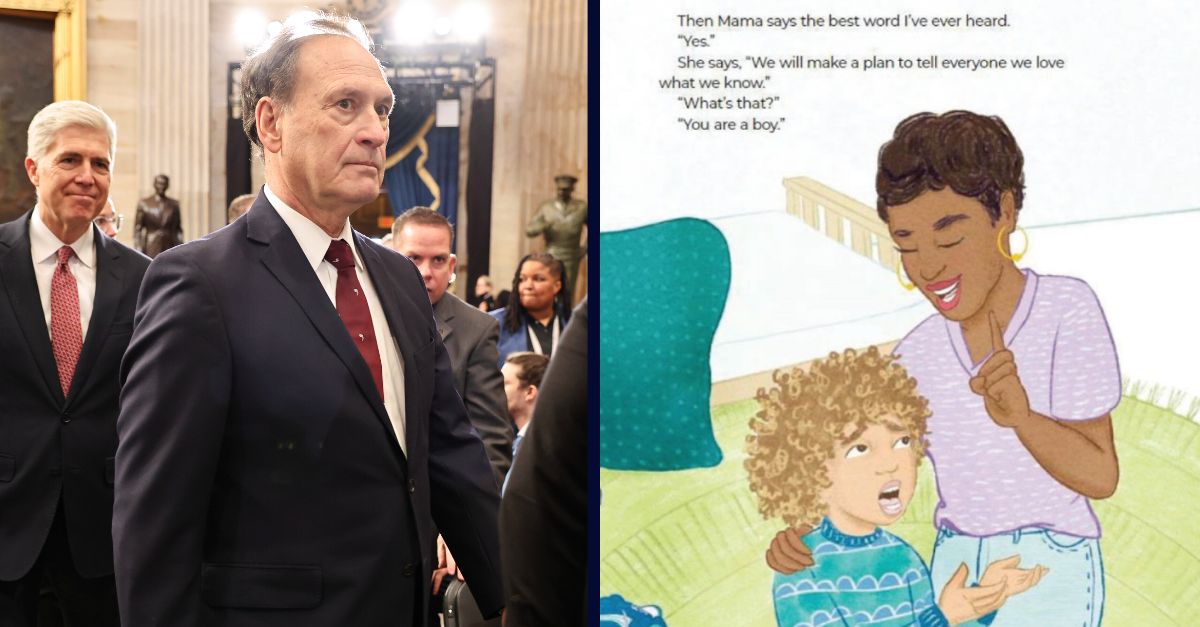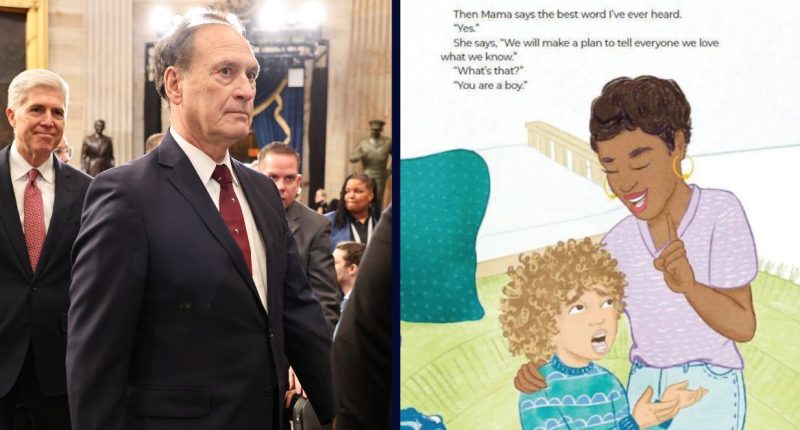
Left: U.S. Associate Supreme Court Justice Samuel Alito Jr. attends inauguration ceremonies in the Rotunda of the U.S. Capitol on January 20, 2025 in Washington, DC. Donald Trump takes office for his second term as the 47th president of the United States (Photo by: Chip Somodevilla/picture-alliance/dpa/AP Images). Right: An exhibit of an LGBTQ-themed book included in the Supreme Court”s opinion in Mahmoud v. Taylor (U.S. Supreme Court).
In a major win for social conservatives, the U.S. Supreme Court on Friday sided with Muslim, Catholic, and Ukrainian Orthodox parents in Maryland who sued so they could opt their children out of “LGBTQ+-inclusive” book-reading at public schools in Montgomery County.
All six of the court’s conservative justices, led by Justice Samuel Alito, ruled in favor of the parents, and all three of the court’s liberal justices noted their dissent.
In the opening lines of his majority opinion in Mahmoud v. Taylor, Alito slammed the Montgomery County Board of Education for reneging on a policy that would have allowed parents to opt their children out of LGBTQ-themed instruction that conflicted with their religious beliefs.
“A government burdens the religious exercise of parents when it requires them to submit their children to instruction that poses ‘a very real threat of undermining’ the religious beliefs and practices that the parents wish to instill,” Alito wrote.
Severely criticizing the board for its “abject refusal to heed widespread and impassioned pleas for accommodation,” Alito said the plaintiff parents are “likely to succeed on their claim that the Board’s policies unconstitutionally burden their religious exercise.”
The petition for a writ of certiorari from September, submitted by the Becket Fund — which describes itself as “the premier religious liberty law firm” — argued that the parents had every right to sue because even the board’s “own principals” had once “objected that the curriculum was ‘not appropriate for the intended age group,’ presented gender ideology as ‘fact,’ ‘sham[ed]’ students with contrary opinions, and was ‘dismissive of religious beliefs.'”
The Becket Fund maintained that the board’s subsequent reversal, not allowing opt-outs and not notifying parents when the books at issue were to be read, violated Free Exercise Clause of the Constitution.
On Friday, the Supreme Court majority agreed, and in retrospect, April oral arguments in the case more than tipped the majority’s — and Alito’s — hand.
Alito expressed concern multiple times that the books were sending a “clear moral message” that favored acceptance of same-sex marriages.
“Yeah, the book has — the book has a clear message, and a lot of people think it’s a good message, and maybe it is a good message, but it’s a message that a lot of people who hold on to traditional religious beliefs don’t agree with,” he said.
Love true crime? Sign up for our newsletter, The Law&Crime Docket, to get the latest real-life crime stories delivered right to your inbox
Justice Amy Coney Barrett warmed to that view.
“It’s saying: This is the right view of the world. This is how we think about things,” she said. “This is how you should think about things. This is like 2 plus 2 is 4.”
And so did Justice Neil Gorsuch, stating that “some people think X, and X is wrong and hurtful and negative” would amount to “more than exposure” to LGBTQ-themed books.
Later on, Alito asked why it wouldn’t be feasible to let parents opt their kids out since they weren’t challenging the curriculum as whole.
“What is the big deal about allowing them to opt out of this?” he asked.
In his opinion, Alito was persuaded that the lack of opt-outs posed an “objective danger” to parents’ free exercise of their religion, since the “storybooks unmistakably convey a particular viewpoint about same-sex marriage and gender.”
“In light of the record before us, we hold that the Board’s introduction of the ‘LGBTQ+-inclusive’ storybooks — combined with its decision to withhold notice to parents and to forbid opt outs — substantially interferes with the religious development of their children and imposes the kind of burden on religious exercise that Yoder found unacceptable.”
The Supreme Court’s landmark 1972 ruling in Wisconsin v. Yoder set up the legal precedent that the right to free exercise of religion could outweigh a state’s interest in compelling school attendance in at least some cases.
Alito further slammed any suggestion that the parents should just homeschool their kids or seek private education options instead.
“It is both insulting and legally unsound to tell parents that they must abstain from public education in order to raise their children in their religious faiths, when alternatives can be prohibitively expensive and they already contribute to financing the public schools,” he wrote.
In closing, Alito agreed that the plaintiff parents had every right to sue.
“The First Amendment protects the parents’ religious liberty, and they had every right to file suit to protect that right,” Alito added.
In a lengthy dissent from the liberal wing of the court, Justice Sonia Sotomayor — joined by Justices Ketanji Brown Jackson and Elena Kagan — argued that the conservative majority did little other than opening the door for parents to object to any ideas in public schools that are incompatible with their religious beliefs.
“Public schools, this Court has said, are ‘at once the symbol of our democracy and the most pervasive means for promoting our common destiny.’ They offer to children of all faiths and backgrounds an education and an opportunity to practice living in our multicultural society,” Sotomayor wrote. “That experience is critical to our Nation’s civic vitality. Yet it will become a mere memory if children must be insulated from exposure to ideas and concepts that may conflict with their parents’ religious beliefs.”
“Today’s ruling ushers in that new reality,” she continued.
Sotomayor asserted that the books at issue merely expose students to the “‘message’ that LGBTQ people exist, and that their loved ones may celebrate their marriages and life events[.]”
The liberal justice predicted that “chaos” will follow in public schools across the country and “impose impossible administrative burdens on schools” that will harm teachers and their students.
“The harm will not be borne by educators alone: Children will suffer too. Classroom disruptions and absences may well inflict long-lasting harm on students’ learning and development,” Sotomayor continued. “Worse yet, the majority closes its eyes to the inevitable chilling effects of its ruling.”
In her concluding paragraph, Sotomayor said that the conservative majority has “in effect” constitutionalized a “parental veto power over curricular choices long left to the democratic process and local administrators” — which she called a “grave misjudgment” that may reverberate for “generations.”
Elura Nanos contributed to this report.








